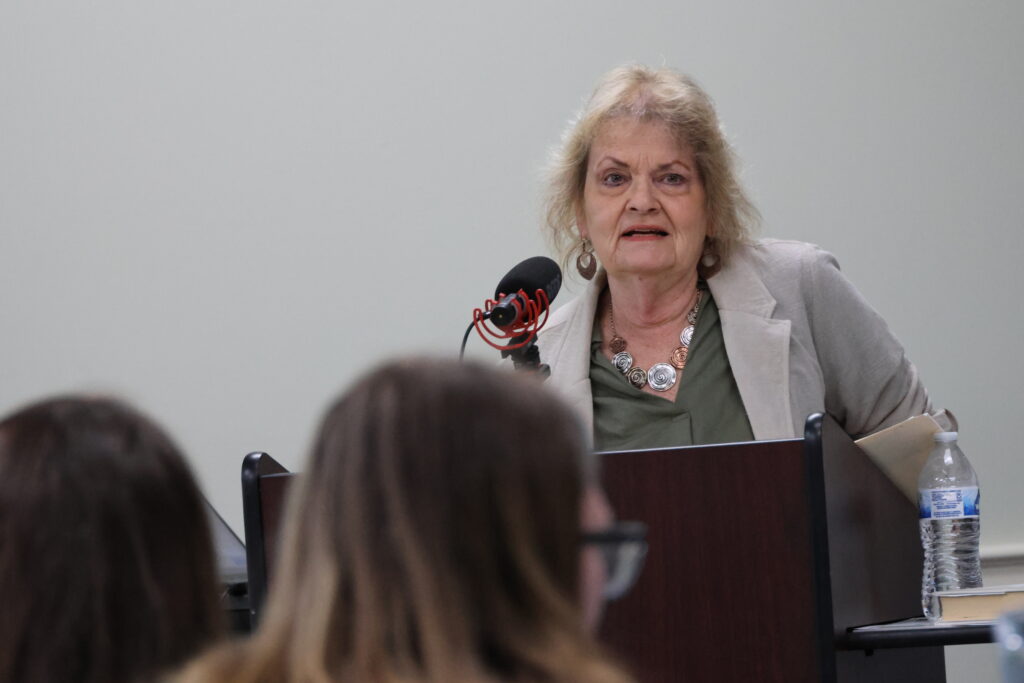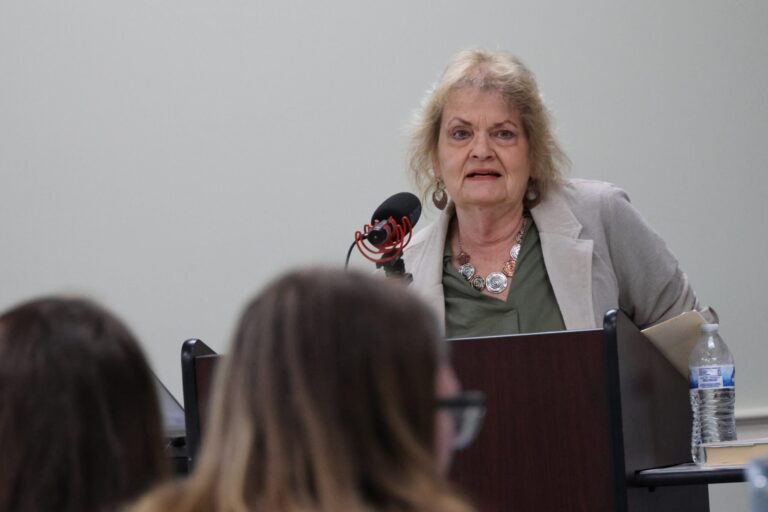Mental Health Symposium: Harm Reduction and Syringe Exchange
Published Monday, June 10, 2024 at 4:30 p.m.

- Boyle County ASAP Coordinator Cathy Miles speaks about harm reduction at the symposium. (Photo by Lance Gaither)
lance.gaither@bluegrassnewsmedia.com
May 2024 was Mental Health Awareness Month. Ephraim McDowell Health and the Danville Rotary Club teamed up to host a Mental Health Symposium on May 29th at the Boyle County Library to encourage discussion about mental health in the community.
At the symposium, Boyle County Substance Abuse Agency Director Cathy Miles spoke about the connection between mental health and substance abuse, the importance of harm reduction, and the benefits of needle exchange programs.
“When it comes to substance abuse and mental health, think of recovery readiness as a puzzle,” Miles said, “a puzzle that combines research findings with what we know in our community. We need to help people achieve long-term recovery from mental health and substance use disorders.”
Miles explained that the heroin and opioid epidemic really hit Boyle County in 2015.
“We realized we had heroin in Boyle County, and for a lot of people, it was a harsh reality,” Miles said. “People thought heroin was an urban problem and it didn’t exist in our area, but it did. In 2016 and 2017, we dealt with issues like overdoses. We had a 10-day period where we had a high number of overdose deaths. Boyle County was hit hard.”
Miles said the community recognizes that addressing the issue requires a joint effort between law enforcement, medical professionals, treatment professionals and the community, and that utilizing individuals who are in recovery is essential to the program’s success.
“We can’t leave behind the people who were there,” Miles said, “people who have so much to give to the community but often aren’t allowed to give.”
Miles discussed the notion of “recovery capital,” a relatively new concept in addiction treatment. This refers to the resources, support, and opportunities available to individuals in recovery. Recovery capital includes the physical, social, and emotional assets that enable a person to maintain sobriety and overcome addiction.
For people struggling with addiction, recovery funding is crucial because it provides a safety net to help them get through the challenges of recovery. Recovery funding includes elements such as access to healthcare, housing, employment and social connections, which can help reduce stress and increase well-being. Recovery funding also includes having a supportive network of friends and family who can provide emotional support and encouragement.
Adequate recovery funding can significantly improve treatment outcomes and reduce the risk of relapse. Research shows that people with higher levels of recovery funding are more likely to maintain abstinence and experience improved mental health. On the other hand, those with limited recovery funding may be more likely to relapse due to lack of access to resources and support.
“We don’t dismiss a person’s inner commitment to recovery,” Miles says. “When the community supports recovery it makes a big difference. Addiction is a treatable illness, but it’s a chronic illness, and people need constant help along the way.”
She explained that Boyle County is the first officially recognized Recovery Ready Community in Kentucky. Recovery Ready Communities identify their own needs and develop improvement plans.
“We’re not perfect,” Miles said. “We still have shortcomings. We don’t have a residential treatment program in Boyle County. We know there are other shortcomings, but we’re still addressing the stigma issue. We still have work to do.”
Harm Reduction is a program that uses research-based methods to communicate with people struggling with substance use disorders and provide them with tools and knowledge that can save their lives.
“Everybody has value,” Miles said, “even people who use drugs. They deserve help at some point in their lives. It used to be said, ‘When you hit rock bottom, get help,’ but with the drugs that are out there today, hitting rock bottom means death.”
In addition to reducing overdose deaths, harm reduction policies are proven to reduce disease transmission. People can bring used needles to the Boyle County Health Department’s syringe exchange program to receive clean needles, reducing the risk of disease spreading through dirty needles.
“You have to build relationships that matter,” Miles said. “People will come back to the health center again and again if someone cares about them and gives them what they need. Change is a process for everyone.”


